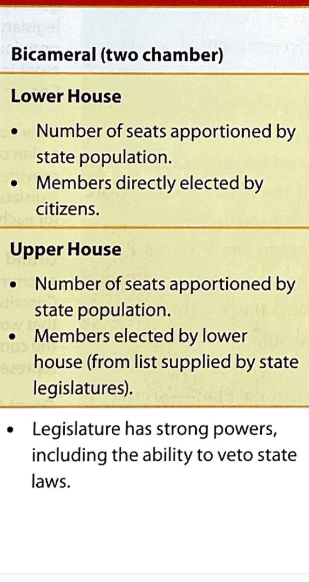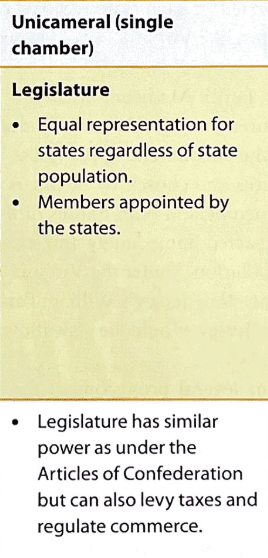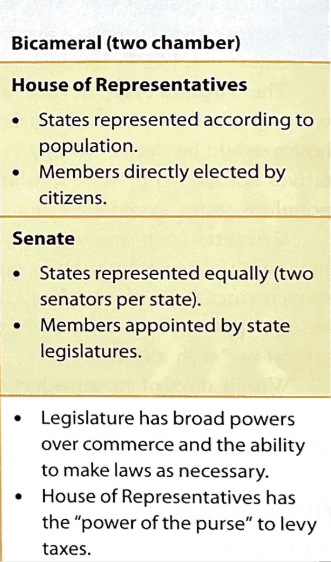AP Gov - Unit 1: Foundations of American Democracy
1/160
There's no tags or description
Looks like no tags are added yet.
Name | Mastery | Learn | Test | Matching | Spaced | Call with Kai |
|---|
No analytics yet
Send a link to your students to track their progress
161 Terms
State of Nature
Without government being involved, the ‘State of Nature’ is when people do whatever they want with no regulation from others.
Social Contract
People allow for government to have authority over them to promote an orderly and functioning society
Mayflower Compact
A list of rules by the pilgrims on the Mayflower to ensure equality once they land on American soil.
Hobbes’ Social Contract & State of Nature
Hobbes believed that the state of nature is what causes man to be solitary and violent. In order to appease these urges, he states that in the social contract, the authority of the government is absolute, but not all-encompassing.
Locke’s Social Contract & State of Nature
Locke believed that the state of nature allowed for individuals to innately have independence, peace, and liberty and not savagery. Under the Social Contract Theory, humans will nevertheless agree to a government and leave the state of nature behind.
Rousseau’s Social Contract & State of Nature
Rousseau believed the state of nature is in neutral and peaceful conditions, with individuals acting according to their basic urges. With the social contract theory, these individuals start to become increasingly dependent on one another.
Liberty and Order
A balance between governmental power and individual rights has been a hallmark of American political development
What idea(s) is the U.S. government based on?
Limited Government: natural rights, popular sovereignty, republicanism, and social contract
Declaration of Independence
Drafted by Jefferson with help from Adams and Franklin, provides a foundation for popular sovereignty.
Natural Rights
Rights that are inherent, you have them automatically and they can not be taken away
Popular Sovereignty
Government’s right to rule comes from the people
Republicanism
Government’s authority comes from the people, the government is a reflection of the people
Declaration of Independence
Telling King George that we don’t want to be ruled over by him
Provides a foundation for popular soverignty
What does Jefferson have to say about the State of Nature?
He argues that inherent and inalienable rights, such as life, liberty, and the pursuit of happiness, are derived from this equal creation. Thus, governments are established to protect these rights by deriving their power from the consent of the governed.
For what reason does Jefferson state that ‘governments are instituted among men’?
to secure the unalienable rights of life, liberty, and the pursuit of happiness. He explains that when a government fails to protect these fundamental rights, it is the people's right and duty to alter or abolish it and establish a new government that will better ensure their safety and happiness.
Where does John Locke show up in the Declaration of Independence?
"...all men are created equal, that they are endowed by their Creator with certain unalienable Rights, that among these are Life, Liberty and the pursuit of Happiness"
What are America’s natural rights?
fundamental, inalienable rights that people possess by nature and cannot be taken away by any government; life, liberty, and the pursuit of happiness
What happened to the Social Contract between England and its American colonists?
Because King George:
-got rid of representative houses for opposing him
-sent officers to harass the colonies
obstructed administration of justice
What is the responsibility of the people when the government threatens their natural rights?
to alter or abolish them
From where will power come in the newly independent United States?
the people
how is the resolution of independence an example of republicanism?
authority comes from the people.
A System of Limited Government
A system of LIMITED GOVERNMENT was designed to keep power closest to the people
Articles of Confederation
US Constitution
Goals of limited government
Natural Rights
Social Contract
Popular Sovereignty
Republicanism
What is the root of government?
Government is rooted in a fundamental tension between the State of Nature and the Social Contract
Desire for Liberty versus the need for Order
… whenever any form of government becomes destructive to these ends, it is the right of the people to ALTER or abolish it…
Representative Democracies
Representative Democracies can take several forms along this scale:
Participatory: broad participation
Pluralist: group-based activism
Elite: limited participation
What aspects do the U.S. constitution and the debates between Fed #10 & Brutus #1 represent?
They reflect the tension between the broad participatory model and the more filtered participation of the pluralist and elite models
The 3 Models of representative democracy continue to be?
reflected in contemporary institutions and political behavior
Democracy
[Demos: People; Kratos: Power] – system of government where power is held by the people
PARTICIPATORY DEMOCRACY
widespread political participation is essential for a democratic government
PLURALIST DEMOCRACY
groups (rather than individuals) are key to the policymaking process
ELITIST DEMOCRACY
elite members of society have the majority of influence on the policymaking process
Federalist Papers
Penned by ‘Publius’
Alexander Hamilton, James Madison, John Jay
Collection of 85 essays to support ratification of the Constitution
Supported strong national government
Worried about ‘tyranny of the majority’
Anti-Federalist Papers
Penned by ‘Brutus’
Collection of 16 essays to raise concerns about the Constitution
Supported strong state governments
Worried about oppression of individual/state rights by central authority
Fear and Government
Federalists and Anti-Federalists each feared the new government may fail
TYRANNY OF THE MAJORITY
Fear that the majority (poor) could overwhelm a smaller ruling class (wealthy)
Mostly held by the Federalists – wanted to design systems that favored an elite ruling class against ‘mob rule’
Elite
The best way to protect the rights of the people from dangerous factions is to encourage a large republic of competing groups.
Pluralist
TYRANNY OF THE MINORITY
Fear that an unpopular minority could use centralized power to crush a majority
Mostly held by the Anti-Federalists – wanted to provide protections and safeguards that placed limits on the power of an elite ruling class
Advocates for broad citizen involvement in the political process, as opposed to pluralist or elitist models where power is concentrated in specific groups.
Participatory Democracy
The federalists belief on big or small government.
The federalists believed that the greatest threats to a republic was a faction. The key to controlling factions was to have a big government.
The anti-federalists belief on big or small government.
The anti-federalists believed a large government wouldn’t be able to effectively represent the people’s interests and would limit the representations of the people. They also feared a big national government and military.
Which of the following is an example of the pluralist theory in American democracy?
Weakness of participatory model
untrained or uneducated people may significantly influence decision-making
Weakness of pluralist model
Groups may possess advantages over others on the basis of race, gender, class, money, etc. that allows some groups to have more representation than others
Weakness of elitist model
limits opportunity to only select members of society
Constitutionalism
The Constitution emerged from the debate about the weaknesses in the Articles of Confederation as a blueprint for limited government
Fed #10
the superiority of a large republic in controlling the “mischiefs of faction,” delegating authority to elected representatives and dispersing power between the states and national government
Brutus #1
adhered to popular democratic theory that emphasized the benefits of a small, decentralized republic while warning of the dangers to personal liberty from a large centralized government
Treaty of Paris 1783
granted the US independence, specifically mentioned each of the 13 states separately as becoming independent
The Bill of Rights (1791)
Ratification for the Constitution became dependent on the Bill of Rights
Without explicit protection of individual rights, the Constitution likely would have failed to meet the threshold for ratification
Bill of Rights (First 10 Amendments) outlined individual rights that could not be infringed on (taken away) by the national government
(national) Gov’t Power
Chief Executive (President)
National judges appointed (not elected)
Electoral College
Senators elected by state legislatures (not the people)
6 year terms
Upper Chamber
Preservation of property rights
Individual Rights
Lower Chamber (House of Reps.)
Bill of Rights; Amendments 1-10
(9) protection of individual rights not listed in the Constitution
(10) powers not given to federal government reserved to the states or people
Impeachment of elected officials
What does Madison believe is the proper role of Government?
Madison believes that the proper role of the government is to help solve the problems created by factions.
What does Brutus believe is the proper role of Government?
Brutus believes that there should be stronger state governments and a central government that’s weaker and doesn’t oppress individual rights.
What does Madison believe about the appropriate size and power of a national government?
Madison believes in a strong national government, but he also believes that state governments should have legislative power as well, hence the idea of representatives from each state.
What does Brutus believe about the appropriate size and power of a national government?
Brutus believes in a weaker, smaller national government and doesn’t believe in the federalists idea of state representatives because of how vast the opinions of the states and overall nation are and a representative won’t know what’s in the best interest of the people they’re supposed to represent.
Articles of Confederation
Formed in 1777 as an emergency to govern the United States during the Revolutionary War
Formally ratified in 1781
Sovereignty (power) with the STATES, not the national government (Confederation Congress)
The government under the Articles of Confederation?
One-House Legislature
No Chief Executive, No Judicial Branch
How many votes did the states have?
One-vote
How many states to pass a law?
9/13
How many states to ratify/change an amendment?
13/13
The purpose of the Articles of Confederation
Americans fighting against oppression of central government
Less powerful central government = more individual liberty – that’s the whole point of what they are doing in the Revolution
Weakness of the Articles of Confederation
No power to tax – request states to send funds to pay for national interests
Also = no money for a national army (but they could have one if they wanted)
Foreign policy and internal domestic policy (interstate trade) were complicated by a lack of national sovereignty
Competing Self-Interests
Citizens had greater affinity toward their own state, than a national body
Didn’t trust other states nearly as much as their own
States had competing self-interest over land/territory, economics, trade, representation, etc.
Each State had 1 Vote in the Confederation Congress – population or territorial size did not matter
An independent nation won’t long last if the states collapse into internal rebellions and violent squabbles
Annapolis Convention – Fall 1786
A Meeting to Restructure the Gov’t from the Articles of Confederation
Only 5 states showed up – no important business can be accomplished
Bitterly disappointed delegates passed a resolution to meet the following spring (1787) in Philadelphia to try again
Why they didn’t want a government reform:
Fear of the overturning of protections to own slaves
Small states feared a loss of power to the bigger states
Remaining fear of centralized power
Shays’ Rebellion
Winter 1786-1787
Daniel Shays – Common Farmer – leads popular uprising against the state government of Massachusetts over taxes
Why Shays rebelled?
In order to pay off Revolutionary War debts to wealthy citizens and officials, the state of Massachusetts raised taxes which common people could not afford to pay
Angry citizens revolted echoing cries of ‘no taxation without representation’ heard during the war against England
Compromises deemed necessary for adoption and ratification of the Constitution are represented by the:
Great (Connecticut) Compromise
Electoral College
Three-Fifths Compromise
Compromise on importation of slaves
The compromises necessary to secure ratification of the Constitution left:
some matters unresolved that continue to generate discussion and debate today
What remains at the heart of present-day constitutional issues about democracy and governmental power?
The debate over the role of the central government, the powers of state governments, and the rights of individuals
Examples:
Debates about government surveillance resulting from the federal government’s response to the 9/11 attacks
The debate about the role of the federal government in public school education
Constitutional Convention
The meeting in Philadelphia (Spring 1787) led to the creation of a new government – The US Constitution
55 delegates from 12 of 13 states attended (No Rhode Island)
Madison, Washington, Franklin, Hamilton – all members of elite society
The first vote of the constitutional convention was to:
maintain total secrecy over their deliberations
The second vote of the constitutional convention was to:
create an entirely new system of government rather than to revise the original Articles of Confederation
The national government’s power was now:
Expanded
What was the legislature under the constitution?
2 house legislature (lower: people; upper: state legislatures)
Other branches under the constitution:
Executive Branch
National court system with enforceable powers (Judicial Branch)
What was the U.S. constitution the product of?
Many political compromises
Great (Connecticut) Compromise
resolved disputes between big (Virginia Plan) and small (New Jersey Plan) states over representation (Article 1)
Lower house representation based on population, upper house each state equal
Three-Fifths Compromise
slaves will count for population but only as 3/5 of a person
(Article 1 Section 2)Southern states will hold disproportionate power for a long time (preserve slavery)
Importation of Slaves
Congress will not restrict the “importation of such Persons” until 1808 (Article 1 Section 9)
Electoral College
People will vote, but the Electors will determine the election outcome for President (Article 2 Section 1)
Virginia Plan

New Jersey Plan

Great Compromise

Individual Rights
Individual Rights are not a primary feature of the US Constitution
Article 6
No religious test for holding office
Article 1 Section 9
Government must explain why someone accused of a crime is being held (Habeas Corpus)
Article 1 Section 9 (P2)
Legislature can not declare someone guilty without a trial
Article 1 Section 9 (P3)
Can not be charged for a crime, that was not a crime at the time an act was committed
Article 3 Section 2
Right to a jury trial in criminal cases
National Gov’t Power (Constitution)
Chief Executive (President)
National judges appointed (not elected)
Electoral College
Senators elected by state legislatures (not the people)
6 year terms
Upper Chamber
Preservation of property rights
Individual Rights
Lower Chamber (House of Reps.)
Bill of Rights; Amendments 1-10
(9) protection of individual rights not listed in the Constitution
(10) powers not given to federal government reserved to the states or people
Impeachment of elected officials
Making Changes to the Constitution
By establishing an Amendment process, the Founders ensured that the gov’t would endure into the future
An Amendment must be supported by:
2/3 of BOTH chambers (House and Senate) OR 2/3 of all the state legislatures
An Amendment must be ratified by:
3/4 of state legislatures OR ratification conventions in 3/4 of all the states
How many total amendments?
There are 27 amendments (First 10 of which are the Bill of Rights)
Amendment 18 is canceled by Amendment 21 (Prohibition)
Whiskey Rebellion
Corn Farmers in Pennsylvania protest tax on whiskey
threat to their economic interests
Attempt to mount a revolution similar to Shays’s Rebellion
Washington mounts a horse and rides out to put down rebellion
Gov’t exercises coercive power to squash popular sovereignty
Policy-Making Interests
The Constitution created a competitive policy-making process to ensure the people’s will is represented and that freedom is preserved
The powers allocated to Congress, the president, and the courts demonstrate:
the separation of powers and checks and balances features of the Constitution
Federalist No. 51
explains how constitutional provisions of separation of powers and checks and balances control abuses by majorities
Multiple access points for stakeholders and institutions to influence public policy flows from:
the separation of powers and checks and balances
Impeachment, removal, and other legal actions taken against public officials deemed to have abused their power reflect the purpose of:
checks and balances